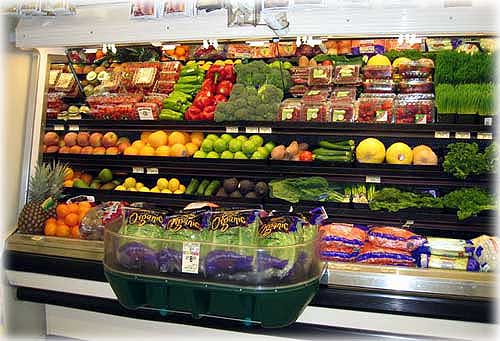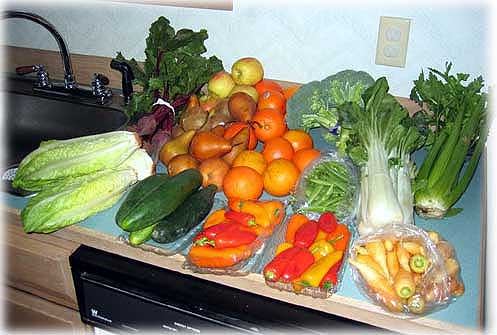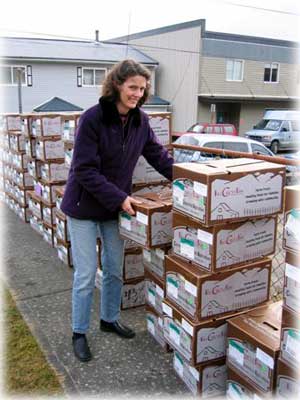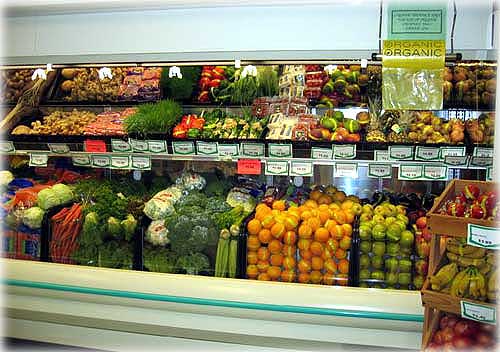 By Nancy Coggins July 07, 2006
Over roughly the past five years, you've probably noticed that the price of organic food has gradually been coming down. Phil Lempert, supermarket-trend analyst, confirms this in The Green Guide, a source of information on organic food.
Why are more people eating organic food? Organic food is now more readily available. And it contains no toxic chemicals. Most organic food can be eaten with its skin on, providing the benefit of additional vitamins and minerals. According to a leading microbiologist and nutritionist, Dr. Robert O. Young, organic produce contains as much as 300% more nutrients than non-organic. Organic farmers use none of the chemicals the EPS now considers carcinogenic -- 60% of all herbicides, 90% of all fungicides and 30% of all insecticides. Eating organic is one opportunity to choose a path to optimum health, lowering our risk of heart disease and cancer that seem so rampant these days. After consuming fresh organic produce for six weeks or so, you may suddenly experience an "Aha!" moment - like, "I feel great!" Another advantage to eating organic food lies deeper in the ground. Instead of using synthetic chemical fertilizer, organic farmers use a combination of either farm-made or commercially-produced non-synthetic organic fertilizer and mature compost. How did so-called "organic farms" originate? As farms in Europe and Japan grew farther and farther away from the center of their own communities, there was a gradual loss of quality in produce, and CSAs (Community Supported Agriculture) began to form. In 1985, several biodynamic gardeners brought the idea of CSA from Japan to North America, and the CSA trend in the U.S. has been growing ever since. The CSA type of farming represents a collaboration between farmers and consumers to ensure a safe and healthy food source. The number of Americans who buy organic food "has grown at a rate of about 20% a year over the past 12 years" says Katherine DiMatteo, Executive Director of the Organic Trade Association, which represents the organic industry in the U.S., Canada, and Mexico. She continues, "Correspondingly, the number of organic farmers has risen from 5,500 in 1997 to 7,800 in 2000."  Photo by Nancy Coggins
CSA is about ecology: "The Earth is a living Being and the actions of every individual have an effect on the whole. The soil is the basis of all human life, and the quality of its care and health effect not only the people who eat the food today, but also those who will depend on the soil in the future." CSA is about health: "Healthy soil means healthy food. When no herbicides, pesticides or artificial fertilizers are used, ground water pollution and toxic residues on food are avoided." Buying organic food helps contribute to the protection of our natural resources in many ways. Organic farms use 50% less energy than conventional ones, according to the Organic Trade Association. Organic farms that run their tractors on biodiesel fuel instead of fossil fuel are helping to decrease global warming. Using biodiesel energy for their tractors eliminates the production of harmful carbon monoxide and carbon dioxide that are linked to this phenomenon. Active tree planting on organic farms provides a healthy habitat for wildlife. Cover crops protect against erosion of soil that becomes river-clogging sediment. Thus, by supporting organic farmers at our supermarket and our nearest organic farm, we are making a contribution to environmental stewardship.
Photo by Nancy Coggins
Nearly everyone in the U.S. can find and order from a CSA farm by going online: http://www.biodynamics.com/csa.html. In your search, you will see that each CSA farm varies in its length of growing season, crops grown, level of social activities, and prices. In Ketchikan, Alaska, the closest commercial organic farm is Full Circle Farm, located in Carnation, Washington, just East of Seattle. After placing your weekly or bi-weekly order online at www.fullcirclefarm.com, you will be able to pick up your personalized box from a neighbor's porch, walkway or garage at your pre-selected drop-off site.  Photograph by Nancy Coggins
Full Circle Farm has recently been involved in Alaskan Community projects, creating the Full Circle Farm Juneau CSA, and donating funds to Juneau's Duck Creek Restoration. In September 2005, Full Circle Farm owner Andrew Stout was recognized by the Puget Sound Business Journal not only as one of 40 rising successful business stars for the region but also as a person with the ability to lead the community into the future. In Ketchikan, finding fresh organic produce is as easy as a visit to your favorite supermarket. SafeWay, A&P Market and Tatsuda's IGA all carry a large selection of fresh organically grown produce. Organic food, whether purchased from Ketchikan's supermarkets or nearby organic farms, helps us take care of our own health and that of the planet - one purchase or one personalized box at a time.
Book reference:
On the Web:
Publish A Letter on SitNews Read Letters/Opinions
|
||

